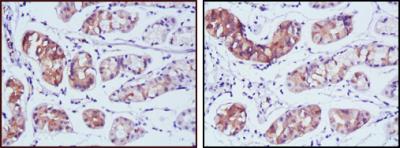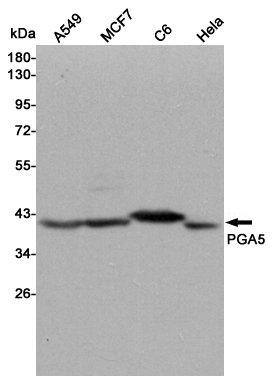-
Product Name
Anti-PGA5/Pepsinogen 5 (1G8) Mouse antibody
- Documents
-
Description
PGA5/Pepsinogen 5 (1G8) Mouse monoclonal antibody
-
Tested applications
WB, IHC-P
-
Species reactivity
Human
-
Isotype
Mouse IgG1
-
Preparation
Antigen: Purified recombinant fragment of human PGA5 expressed in E. Coli.
-
Clonality
Monoclonal
-
Formulation
Ascitic fluid containing 0.03% sodium azide.
-
Storage instructions
Store at 4°C short term. Store at -20°C long term. Avoid freeze / thaw cycle.
-
Applications
WB: 1/500 - 1/2000
IHC: 1/200 - 1/1000
ELISA: 1/10000
-
Validations

Immunohistochemical analysis of paraffin-embedded human stomach cancer tissues using PGA5 mouse mAb with DAB staining.

Western blot detection of PGA5 in A549,MCF7,C6 and Hela cell lysates using PGA5 mouse mAb (1:1000 diluted).Predicted band size:42KDa.Observed band size:42KDa.
-
Background
Swiss-Prot Acc.P0DJD9.PGA5: Pepsinogen 5, group I (pepsinogen A). Pepsinogens are the inactive precursors of pepsin, the major acid protease found in the stomach. Pepsin is one of the main proteolytic enzymes secreted by the gastric mucosa. Pepsin consists of a single polypeptide chain and arises from its precursor,pepsinogen, by removal of a 41 amino acid segment from the N-terminus. Pepsinogen is synthesized in the stomach lining, and hydrochloric acid, also produced by the gastric mucosa, is necessary to convert the inactive enzyme and to maintain the optimum acidity (pH 1-3) for pepsin function. Pepsin is particularly effective in cleaving peptide bonds involving aromatic amino acids. Pepsin shows extremely broad specificity; although bonds involving phenylalanine and leucine are preferred, many others are also cleaved to some extent. PGA5 is a member of the subfamily A1 within the pepsin family and is the predominant endopeptidase in the gastric juice of vertebrates.PGA5 is inhibited by ovUS-1, a uterine serpin.
Related Products / Services
Please note: All products are "FOR RESEARCH USE ONLY AND ARE NOT INTENDED FOR DIAGNOSTIC OR THERAPEUTIC USE"
